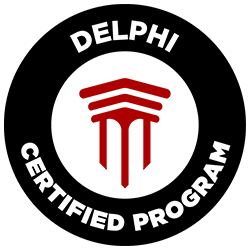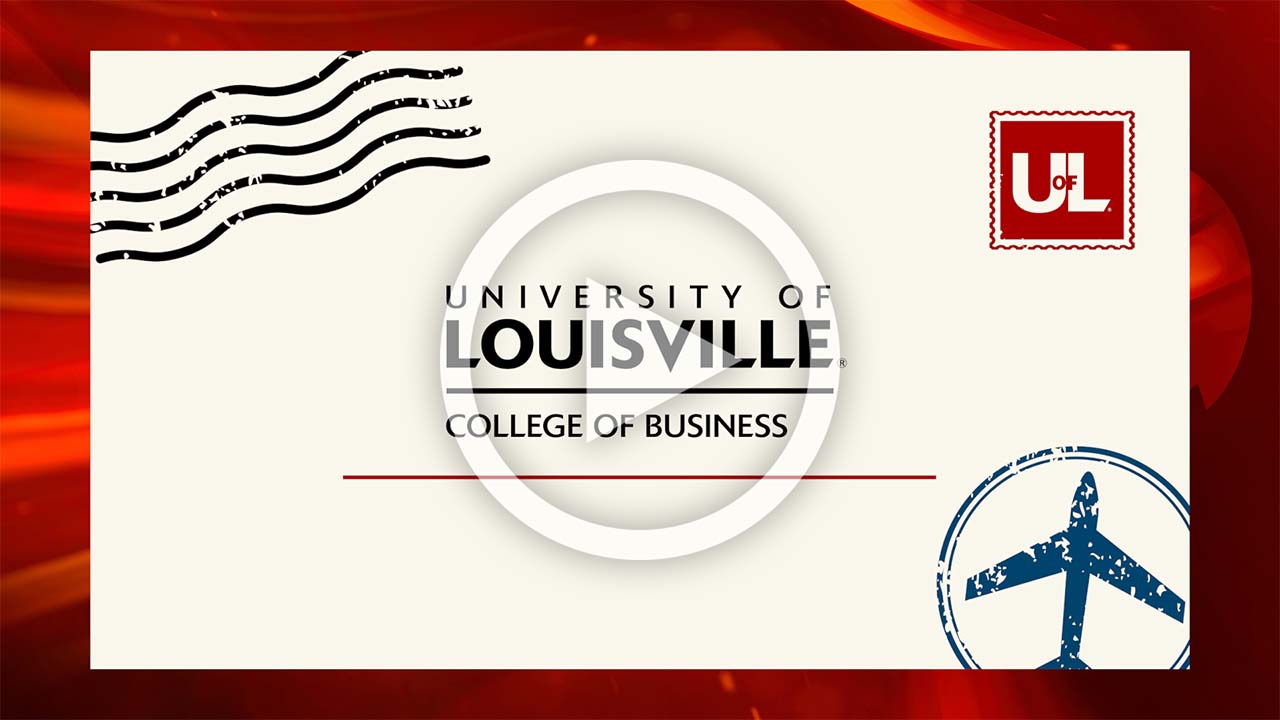This white paper was a careful analysis of the professional sports industry. The paper investigated various operations such as marketing, financial management, economic impact, supply chain management, and more across the NFL, NBA, and MLB, respectively. The findings note that, as an economic driving force, professional sports both create and strengthen new and existing industries.
Online Master of Business Administration

The online Master of Business Administration (MBA) is designed for working professionals who want to advance their career, broaden their business mindset and distinguish themselves in the workplace, with University of Louisville's 100% online, no GMAT required, MBA program.
This is more than your typical MBA degree. Offered by the College of Business, UofL's online MBA delivers proven business theories, practices and leadership skills to make you a more engaged and effective business professional—online and on your schedule. With an optional 10-day business study trip, innovative electives and certificate opportunities in Distilled Spirits Business, Managerial Analytics, Business of Healthcare, Horse Racing Industry Business or Franchise Management, you can specialize your degree and stand out in today’s competitive market. These benefits and more are part of what make UofL's program one of the best online MBA programs in Kentucky.
Business Cards and Coffee
Schedule a meeting with one of our team members!
Join us at a local Heine Brothers' coffee shop! Bring your business card, get a coffee on us, and learn about the amazing opportunities afforded through our online online business programs. Click below to register!
Register Now!
Friday Virtual Lunch and Learns, Every Friday
12:00 PM
Join us every Friday at noon eastern time for a Lunch and Learn information session about our Online MBA program!
Register Now!
Academic Year Tuition
*FAA rate is 10% tuition scholarship to all online programs. Eligibility excludes uniformed members of Dept of Defense and government contractors.
Does your employer offer tuition reimbursement?
You may be required to submit a request for tuition reimbursement. Download a Sample Request Letter [PDF] to get started.
University of Louisville Online MBA Program Highlights
UofL's 100% online MBA program is customizable and allows you to specialize your studies. Learn from esteemed faculty, guest speakers, business leaders and successful alumni, and develop the business skills to lead teams and drive revenue for your organization. Some of our unique highlights include:
- Skip the GMAT - it is not required for admission.
- Develop vital business skills needed to lead teams and improve the bottom line.
- Expand your business savvy with an optional 10-day business study trip.
- Customize your MBA with certificate opportunities and innovative elective options.
- Become part of an exclusive UofL online MBA LinkedIn group – network with other business professionals across more than 30 U.S. states.
- Experience 1:1 time with expert business school faculty – each cohort is led by an instructional team, complete with designated section leaders who are engaged and ready to support you.
- Learn from business leaders, guest speakers and successful alumni.
- Access your coursework from anywhere with 100% online classes.
- Complete the program in 20 months (5 semesters), or faster if dual-status.
- Gain professional career coaching from the College of Business Ulmer Career Management Center with our Lifetime Career Support Promise.
- Get your education from one of the best online MBA programs in Kentucky.
START YOUR APPLICATION REQUEST INFORMATION
Complete your degree on your own time through fully online coursework.
Learn MoreThe online MBA requires 36 core credit hours (12 courses) and 9 credit hours in electives (3 courses).
Learn MoreExpand your business savvy with a business study trip (optional).
Learn MoreUtilize your Military Experience for a Kentucky online MBA

The University of Louisville is a proud participant in the Yellow Ribbon program. As a military-friendly institution, the College of Business offers several features to assist service members pursuing their MBA:
- Get credit for the work you’ve already completed – up to 6 credits of graduate-level ACE credits can be applied to your MBA elective requirements.
- Defray the cost of the program – competitive, merit-based scholarships are available for active duty military and veterans.
- Stay on track – if you deploy during the program, an academic advisor will work with you to map a personalized plan to get you on the fastest route to graduation.
- Use elective credits to take our military-specific management course, Transitions: Military to Civilian
UofL Online MBA for Transfer Students
Students who have studied at other accredited institutions and wish to complete their degree at the University of Louisville can transfer up to 6 credit hours into our online MBA program.
To help you determine the best way to transfer your credits, we offer a pre-evaluation of credit so you can apply them in a way that matches your long-term goals.
Let your passion for personal and professional change fuel your MBA - only at UofL
If you are wondering how you will apply the knowledge gained in this program to your current role or future career, wonder no more! In our online MBA program, we designed a series of student-centered assignments that provide meaningful and consistent opportunities to apply course concepts to a specific area of interest. The University of Louisville is proud to offer this one-of-a-kind assignment that truly allows our students to specialize their MBA in a way that matters most to them.
To begin the Cardinal Choice Assignment, you will first select a focal area: Career, Industry, or Issue. This is based on whether you want to focus on enhancing knowledge for a current role, future career advancement, change and innovation in a specific industry, or a broader fundamental issue you want to solve for your organization, the community or society at large.
The focus/track you choose will subsequently influence your learning path by:
- Guiding the assignments you will complete in each of the core classes to personalize your experience.
- Allowing you to apply a portion of every core course toward your career, industry, or specific issue you or your organization may encounter.
- Providing you with a well-rounded understanding of methods, approaches, concepts and best practices that help you enhance your skills and prepare you to make a difference in your field.
Apply to our Online MBA program today and learn how you can set your degree apart from the rest!
Watch this video to learn even more about the Cardinal Choice Assignment!
Read some examples and quotes from previous students about the work they completed for the Cardinal Choice Assignment below!
-
Nolan Cook, Industry, Professional Sports Industry
-
Michael Chorney, Industry, Cardinal Health System: Proposal for New CT Imaging Platform
This proposal investigated the viability of Cardinal Health Systems acquiring and implementing a new CT scanner for use in the Cardinal Health Systems’ Emergency Department, and throughout the hospital system. The report provided a clear and fast path to return on investment, indicated the potential for strong revenue, and showcased how the new technology would benefit generations of patients to come.
“The Cardinal Choice assignment affords students the flexibility and latitude to personalize their MBA degree to their chosen career path longitudinally throughout the program, integrating core concepts from each course into a singular vision of one’s own idealized career. In my case, the Cardinal Choice assignment enabled me to connect classroom lessons with applicable problems in healthcare. Building on my experiences, the Cardinal Choice assignment added immense value to my MBA degree and encouraged me to pursue the Business of Healthcare Certificate to focus on my professional goals.”
Michael Chorney
Fall 2022 Cohort -
Aleka Hawes, Issue, Process Improvement Plan (for Formerly Incarcerated Individuals)
This process improvement plan explored the need for a re-entry program for formerly incarcerated individuals. The re-entry program would allow for these individuals to find access to better resources for education and employment, improve mental health, and drive stronger community engagement. The plan also included a multi-step process which would help these individuals along their path to reintegration.
-
Delana Gilkey, Career, Beautician Entrepreneurship
This business plan outlines a strategy to offer boutique beauty offerings to individuals who are learning to take care of hair, skin, and nails after undergoing cancer treatments. While offering general beauty products and services will make up much of the business, having specific offerings for individuals whose lives have been shaken up by cancer and cancer treatments creates a space for an underserved portion of the population to find a new personal sense of beauty.
-
Evan Conley, Industry, Opportunities in Commercial and Industrial Real Estate Development
This white paper examines the changing commercial and industrial real estate market. Shifts due to consumer behavior, workplace habits, and sustainability/ESG considerations have all resulted in shifts in what the workplace may evolve into over the coming years and decades. This white paper examines these factors while considering the implications of technology’s impact on how people conduct business.
-
Gi Ann Leung, Career, Comprehensive Career Plan
In this career plan, Gi outlined many of the financial difficulties the younger generations currently face with managing personal finances, including financial literacy and troubles with credit scores. Gi details some of the individual traits that would make for a strong financial advisor, as well as motivations for using this career as a means to creating a positive societal impact.
-
Jeremy Fejedelem, Industry, Aerospace Industry White Paper
In this whitepaper, Jeremy discusses several different aspects of the aerospace industry, with a specific focus on the 6th Space Warning Squadron (6 SWS), as well as the importance of innovation within the industry. The 6 SWS is responsible for missile warning, missile defense, and space domain awareness. Jeremy explores the importance of maintenance and technological innovation in such a critical component of the United States Armed Forces.
-
Jonathan Short, Issue, Process Improvement Sustainability Efforts within the Tobacco and Nictoine Industry
Many industries throughout the world are going to be impacted by changing environmental and sustainability initiatives and legislations, including and especially the tobacco/nicotine industries, respectfully. Jonathan explores different ways these industries can stay compliant in the face of impending changes.
“The Cardinal Choice Assignment provides the opportunity to creatively link your course work throughout the MBA program to a specific area of your choosing. In my experience, it allowed me to gain a better understanding of sustainability from multiple angles and to develop strategies for implementing positive change in my industry.”
Jonathan Short
Fall 2022 Cohort -
Kristen Southworth, Career, Career Plan
Kristen currently works as the COO with North Lime Coffee and Doughnuts, and provides examples of the skills, tools, and experience she uses to effectively run operations within the company. After years of effective leadership, Kristen discusses the desire to transition into a new company and a new field (including in tech, gaming, and/or entertainment). This career plan explores how Kristen’s skills would translate well into the new field.
What will you gain in UofL's online MBA?
Develop Specialized Expertise
Prepare to stand out in today’s competitive business landscape with focused expertise, gained through an online graduate certificate or innovative electives. Graduate with your MBA and a business certificate, earned at no extra time or cost.
-
Business Certificate Opportunities
Complete a certificate in a focused business area or mix-and-match courses from certificate areas to fit your business interests.
- Business of Healthcare- gain the business skills and healthcare experience necessary to take on leadership roles within healthcare systems, private practices and more.
- Distilled Spirits Business – enhance your broad-based knowledge needed to manage business operations in the distilled spirits industry, including finance, operations, branding, and more.
- Franchise Management – learn critical insights and practical knowledge needed to acquire, run, and grow a franchise business.
- Horse Racing Industry Business – develop broad-based knowledge in the industry areas of crisis management planning, business ethics, sports and wagering analytics, leadership strategy, regulations, and industry nuances.
- Managerial Analytics – gain knowledge and skills in rapidly-developing and in-demand areas including business analytics, artificial intelligence, blockchain, spreadsheet modeling, storytelling through data, and more—all with a business management focus.
NOTE: Certificate courses without prerequisites may be taken individually as part of the 9 required elective hours.
-
Innovative Electives
Innovative Electives
Complete your 9 elective hours by choosing from a selection of courses across various key business areas. Electives are offered in the Spring semester.
- Other electives are available on-campus across various disciplines. Online students are welcome to take seated electives, if desired.
- One-day on-campus professional development (PD) courses are available in inclusive leadership, crisis management, negotiation, and business etiquette. Complete three PD courses and earn 1.5 credit hours of electives.
Expand Your Mindset
10-Day Business Study Trip (Optional)
Experience business firsthand during an optional 10-day study trip, included in the cost of the program.* During this hands-on learning experience, you will gain exposure to a variety of companies, industries and business cultures through a mix of business visits and immersion activities. You will also have the opportunity to expand your network by traveling with fellow UofL MBA students from the online, professional, full-time and innovation programs, as well as College of Business faculty members. Trips occur in May, and could include both international and domestic options such as a San Francisco, New York City, Boston and more. Examples of past international options include but are not limited to Argentina, Chile, China, Croatia, India, Romania, South Africa and Taiwan. Note: Alternate non-travel course section must be taken if study trip is not undertaken.
* MBA program charge includes the cost of the trip minus airfare, most dinners and personal incidentals. No refunds or discounts are applied if the student selects not to travel.
Antigona Mehani, Online MBA, 2020 Cohort
Advance Your Career
UofL’s online MBA prepares you with the proven business knowledge needed to seek new positions and opportunities across a variety of industries, increase your earning potential, broaden your understanding of leadership best practices and take your career in business to the next level.
START YOUR APPLICATION REQUEST INFORMATION
Kathryn Honegger, Online MBA, 2019 Cohort
UofL's Online MBA Application Deadlines
Apply to one of the best online MBAs in Kentucky!
| Deadline | Term | Start Date |
|---|---|---|
| November 1 (Priority Deadline for Scholarship)* | Spring | January 13 |
| December 1 | Spring | January 13 |
| May 1 (Priority Deadline for Scholarship)* | Fall | August 18 |
| August 1 | Fall | August 18 |
Please note, international applications are due November 15 for the Spring semester, and June 1 for the Fall semester.
*We offer a limited number of scholarships for outstanding candidates who demonstrate academic excellence, leadership potential and a commitment to achieving their career goals. Scholarships are awarded on a first come, first serve basis, with no additional application needed. We encourage you to apply early to get a better chance of receiving a scholarship that can help offset the cost of tuition and fees. Application due date and terms subject to change.

How to Apply for the Online Master of Business Administration
- Start your application for graduate admission
- Submit $65 non-refundable application fee
- Upload required materials*
- Request official transcripts from all previously attended colleges and universities. Transcripts are only accepted directly from the institution(s) by email: gradadm@louisville.edu (recommended) or mail: University of Louisville, Graduate School, 2211 S. Brook St., Louisville, KY 40292.
- Create a financial plan
START YOUR APPLICATION REQUEST INFORMATION
Currently pursuing or recently earned a graduate or professional degree from UofL?
You could qualify for dual-status and complete your MBA in just 4 semesters! Reach out to our Online Enrollment Counselors, at 800.871.8635 or online@louisville.edu for more details.
Online Master of Business Administration Admissions Requirements and Materials
To be considered for admission, applicants must have:
- a bachelor’s degree or its equivalent from an accredited institution
- a minimum undergraduate GPA of 2.75 on a 4.0 scale (applicants who do not meet the minimum GPA may inquire about conditional acceptance)
*Required application packet materials include:
- a 1-2 page personal statement describing your interest in the online MBA program, why you selected the University of Louisville, your short- and longterm goals and any additional information you feel is relevant
- two letters of recommendation
- a professional resume
*Your Application Portal:
Once you have started the graduate application, you can check the status and review any additional checklist to-do items. Log in to your application using the email address you used to apply for admission and your password. Your checklist items may include additional materials or documentation that facilitate a smooth admissions process. You will also have access to important contact information and next steps after an admissions decision is made.
International Applicants – Additional Requirements
- WES or ECE formal transcript evaluation – if you studied outside of the United States, you are required to submit your academic records for a formal evaluation (visit www.wes.org or www.ece.org for more information)
- TOEFL scores – score of 79 and higher on the internet-based test required; scores must be 2 years old or less at the time of application
For more information on the admission and application process, please contact our Online Learning enrollment counselors at 800.871.8635 or online@louisville.edu.
UofL Online MBA Courses

The online MBA is a 45 credit hour program that requires 36 credit hours in core courses and 9 credit hours in electives. You can use your electives to earn a certificate in a specialized business area or select from a variety of innovative courses available across various disciplines. These specialized courses allow you to make the most out of education from a Louisville, Kentucky online MBA program.
Delphi Certified Courses:
- Delphi Certified courses align with design practices that are based on national quality standards. When you take a Delphi Certified course, you can expect to see a logical user interface, clear instructions for expected tasks and opportunities for you to communicate with your peers and instructor as the course progresses. All core online MBA courses (not including electives) have earned the Delphi Certified designation.
| Semester | Course Title | Credit Hours |
|---|---|---|
| 1 | MBA 626 Applied Microeconomics for Business | 3.0 |
| MBA 632 Strategic Managerial Communication | 3.0 | |
| MBA 631 Introduction to Statistics and Data Analytics | 3.0 | |
| 2 | MBA 628 Financial Accounting | 3.0 |
| MBA 625 Managerial Accounting | 3.0 | |
| MBA 635 Contemporary Financial Management | 3.0 | |
| MBA 621 Global Business | 1.5 | |
| 3 | MBA 623 Global Learning (Business Study Trip) | 1.5 |
| MBA 630 Operations: Design and Analysis | 3.0 | |
| MBA 668 Information Technology Management in a Digital Economy | 3.0 | |
| 4 | MBA 640 Marketing Management | 3.0 |
| MBA 655 Strategic Management | 3.0 | |
| MBA 656 Leadership and Organizational Behavior | 3.0 | |
| 5 | Elective courses | 9.0 |
Notes about the course sequence:This course sequence represents the order courses will be taken for students starting in the fall semester. The course sequence will be different for students starting in the spring semester. MBA 621 and MBA 623 may be offered at different times throughout the program, depending on scheduling. Additionally, the Cardinal Choice portfolio final submission occurs at the end of the final semester of core courses. For fall cohorts, this will be in their fourth semester, whereas spring cohorts will submit their Cardinal Choice portfolio in their fifth semester. Please contact the College of Business for more information.
MBA Statistics Prework Module – Required for all admitted students
All admitted online MBA students will complete an asynchronous 5-week Statistics Prework Module (non-credit, no cost) that is designed to ensure you're up-to-speed on statistical foundations, and prepare you for success in the program. This module will be offered prior to the start of your first online MBA course.
Online Certificate Options
The graduate certificates offered by UofL's Online MBA program are reflective of the vibrant business culture found in Louisville, Kentucky.
- Franchise Management
- Distilled Spirits Business
- Managerial Analytics
- Horse Racing Industry Business
- Business of Healthcare
NOTE: Certificate courses without prerequisites may be taken individually as part of the 9 required elective hours.
START YOUR APPLICATION REQUEST INFORMATION
Sample Elective Course Descriptions
Elective courses offered are subject to change and vary based on semester. Elective courses are offered in the Spring semesters, taken 2 at a time and are 1.5 credit hours a piece.
Managing in the Future
2035: Managing in a Post Pandemic World. Imagine living in a time when the very foundations of the world are being upended by one single event, COVID-19. An event so powerful that it has literally touched every single human on the planet. How does one prepare to manage and lead in this new world? What would you read? What new skills would you need to learn and what beliefs would should leave behind? Whom will trust when there is so much uncertainty about the future, and the efficacy of sources of information? What questions will you ask when the world of “Black Mirror, Black Lives Matter, Black Swans, Machine Learning, AI Nationalism, CRISPR, Climate Change, Aging, & Social Media all converge? This course is designed for the curious mind; to help you your way into a new way of seeing the future. You will be challenged to reach beyond your comfort zone in a journey to discover new emerging broad social, political, economic, technological, and environmental trends and events that will impact your effectiveness as a manager in a post pandemic world.
Supply Chain Management
This course will focus on various supply chain strategies including push versus pull strategies, efficiency versus flexibility strategies, and outsourcing versus insourcing. Execution of these strategies will be studied through case analysis and readings. The course will also focus on key supply chain performance metrics.
Transitions: Military to Civilian
C4 Leadership is The Military Transition to C-Suite; Command, Control, Communications and Culture. The MBA680 is Comparison in Military Acumen and Corporate Business Acumen for those students transitioning from the Military looking for a competitive edge in the Corporate Business Environment. A career in the Military is like no other and moving into the Business World could be a Culture Shock. Transition from the Military Leadership and Culture is multifactorial challenge and best approached as a process. Students will be introduced to an overview of the different Corporate Business Models, Corporate Strategies, Corporate Leadership Models, and Organizational Culture models within today's Business Climate. Students also will learn about navigating the business structure and evaluating the differences between Military Leadership, Culture, Strategy and Business Leadership, through Interviews and Case Studies of Various Business Disciplines. The course challenges the students to apply practical experience in recognizing what information is important, sifting it for relevance, and employing the knowledge for the competitive benefit in the Business Community.
Advanced Business Analytics
The volume of data generated every day continues to grow exponentially. Being able to mine the available data for information is now a fundamental skill sought by organizations. This course challenges and teaches students how to use powerful statistical tools (e.g. SAS and SPSS) to handle data that come in a variety of forms and sizes in more complex, less structured business situations. Students will participate in extensive hands-on work solving realistic business problems. This course may guide students with handling advanced regression analysis that deals with real-life models and interaction variables, time series analysis, and topics such as path modeling. After taking this course, students should: (1) Approach business problems data-analytically; (2) Think systematically whether and how data can help make better-informed decisions; (3) Be able to interact competently with business analytical tools; and (4) Have a hands-on experience mining data. A review of necessary statistical concepts will be provided as needed.
Advanced Brand Management
This course will cover the principles and practices of developing, managing a sustaining brand value. Course material will cover internal and external brand management initiatives including revitalizing, repositioning and extending brands. Case studies will be utilized to illustrate practical applications of the course topics.
Artificial Intelligence
This course focuses on analytical databases. Analytical databases are databases designed and used for decision support/business intelligence and analytical purposes. The course will provide an overview of business intelligence, including architecture, tools, and methodologies. The course provides a heavy hands-on exposure to topics such as data warehouse design, implementation, and use.
Blockchain
The purpose of this course is to explore Blockchain concepts and how to apply them in a wide range of real business scenarios and explore unique, challenge-based business scenarios using design-thinking methodology.
Business in Eastern Europe
The course aims to explain phenomenon of business in Eastern Europe through economic, cultural, historical, and other perspectives. It will introduce concepts, approaches, strategies, and tactics employed by international and local companies working in this region. Both successful and those who failed. The course consists of lectures, discussions, case studies, individual and group work. Extra materials include market potential and other valuable data.
Design Thinking
Design thinking is a flexible framework or system for applying the discipline of Human-Centered Design - applying empathy to create opportunities or solutions that resolve consumer problems. A Design Thinking approach establishes a methodology and a unifying language for how organizational disciplines interact and collaborate applying creativity, leading to better and faster solutions (innovation).
Equine Race & Sports Analytics
A broad overview of the concepts and methods used in sports analytics as well as how to apply them. Key topics include but are not limited to betting systems for horse racing and other sports, data sources, data analytics tools, productivity measurement, and athlete compensation.
Healthcare Strategy
This course is to build upon your existing courses and frameworks to provide the tools necessary for crafting successful strategies for firms operating in the U.S. health sector. As a participant, you will be introduced to the key strategic problems facing the complete set of healthcare organizations and to develop strategic frameworks that can be applied in a variety of settings. This course will explicitly cover recent healthcare changes, including COVID-19 and how those can represent both opportunities and threats for participants in a variety of markets.
Introduction to Cybersecurity
Cybersecurity tools and solutions examines the attack trends in the current landscape for criminals. The course will demonstrate various tools to understand the criticality of risk these trends pose. Students will learn why technology solutions are picked to operate as a business in today's market.
Core Course Descriptions
University of Louisville Online MBA FAQs
-
Is the business trip required?
No, although the trip does count as a core and the trip is all-inclusive, outside of incidentals and airfare, so we highly encourage you attend if able. Alternate non-travel course section must be taken if the optional study trip is not undertaken. MBA program charge includes the cost of the trip minus airfare, most dinners and personal incidentals. No refunds or discounts are applied if the student selects not to travel.
-
Am I required to visit campus at any point?
No, you are not required to visit UofL's campus. You are welcome to visit at any time to meet with faculty, admissions team, career services, etc., and to participate in the university-wide commencement ceremony.
-
Is there a part-time option?
No. Our program is cohort based which means you will complete 9 credit hours per semester over 5 semesters. However, the courses themselves are accelerated, so you only ever take 1 course at a time, completing 3 – 4 courses in a semester. We have found that students appreciate the structure of the program (no worries over which class to take and when) and find that the structure helps them stay on course to graduate. Additionally, we manage your enrollment therefore lessening any undue stress of registration concerns.
-
Is there an active duty tuition rate?
Yes, bundled tuition for active-duty service members is $22,500 for all 45 credit hours ($500 per credit hour).
-
Are there scholarship opportunities available?
Yes! Click here to view the current list of graduate scholarships offered through our College of Business. Please note that scholarships are limited, therefore we encourage you to contact the MBA and Graduate Programs office at 502-852-6440 to discuss your situation.
-
What if I need to take a semester off (or am active duty and have to leave on orders)?
This is not an issue, although we ask that you contact the MBA and Graduate Office and inform them of your situation. As with our on-campus programs, you would rejoin the next cohort and pick up where you left off.
-
How much time should I dedicate to each course per week?
For each 3 credit hour course, you should plan for around 15-25 hours per week. However, this will vary from individual to individual. For example, if you are knowledgeable and/or have had exposure to the subject matter, it may take less time. This may seem time-intensive, but the online MBA is designed so that you take only 1 course every 5 weeks, deliberately allowing you to hyper-focus on the subject matter of the particular course. Further, all the courses are delivered asynchronously, meaning there are never specific class meeting times. The flexibility of this online structure allows you to work around your schedule and priorities each week to complete assignments, etc., by the deadline.
-
Are there any career services available for UofL Online MBA students?
Yes! Our College of Business offers career services for life. To learn more, visit our Career Services page.
-
Am I allowed to visit UofL?
Yes! While the Online MBA Program is 100% online, the University of Louisville College of Business is located in beautiful Louisville, Kentucky, where southern charm meets urban innovation, creating a vibrant tapestry of culture, culinary delights and friendly faces that beckon you to explore. All online MBA students are welcome to visit our wonderful campus at any time to meet with faculty, admissions team, career services, etc., and to participate in the university-wide commencement ceremony. We hope to see you online or in person as a student of our online MBA degree program!
-
Is an online MBA the same as a regular MBA?
While the core curriculum and academic rigor are the same, an online MBA provides the added advantage of flexibility, allowing you to earn your degree on your terms, anywhere. An online MBA empowers you to pursue higher education while staying balanced in other areas of your life, such as work, family and travel.
-
How to choose an online MBA program?
Selecting the right MBA program is all about aligning its offerings with your career aspirations, evaluating its curriculum and other experiential opportunities, considering your preferred learning mode, and networking potential, as well as factoring in location, reputation and financial feasibility. A well-informed choice ensures a program that maximizes your growth potential and paves the way for your future success.
-
How hard is an MBA online?
It depends largely on your ability to balance the MBA coursework with your existing commitments, such as a full-time job or family care. For each three-credit course in the University of Louisville Online MBA program, you should plan for around 15-25 hours of coursework per week. How much time you spend every week on coursework will vary based on the intensity of the course and any prior knowledge you may have of the subject matter.
-
How long does it take to get an MBA online?
On average, the online MBA program takes 20 months, or roughly two years, to complete.
-
How do I know if I should get an MBA?
An MBA could be the right choice if you're looking to advance your career, broaden your business acumen, and strengthen your leadership abilities. It's a valuable investment for those seeking to navigate the complexities of today's business landscape, whether you're aiming to switch industries, take on management roles or start your entrepreneurial journey.
-
How much does UofL’s online MBA cost?
For regular applicants, bundled tuition and fees starts at $38,500. Bundled tuition for active-duty military, Coast Guard and qualifying members of the National Guard/Reserves, starts at $22,500. Tuition assistance and competitive scholarships are available.
Online, but not alone
Your MBA Community
The University of Louisville’s 100% online Master of Business Administration (MBA) program is one of the most personable online MBA programs in the United States. We’ve intentionally designed every facet of our program with the student in mind and offer thoughtfully designed benefits intended to help you feel connected to your team, cohort, program, and your school. We understand that pursuing an online degree can feel lonely at times, especially for those balancing education with work and family obligations. But every step forward is another step towards your degree and lasting change in your life.
Here are a few ways we try to get you involved so that you’re online, but not alone.
-
The Stanley Hall Scholarship
Kenneth Stanley Hall was a first-generation graduate student and member of the Fall ‘19 online MBA cohort. In the Spring of 2020, he passed away due to complications that arose from the COVID-19 pandemic. Stanley’s classmates were obviously profoundly moved by his death, and decided to act to meaningfully honor his life and his legacy. Led by the Fall ‘19 cohort president and vice president, Fall ‘19 cohort banded together and were able to raise $25,000, the required amount necessary to generate an endowment scholarship.
This scholarship is still awarded today, thanks largely to Stanley’s Omega Psi Phi fraternity brothers’ ongoing contributions. Stanley’s family is still involved with the family they have found in UofL’s online MBA program, and still give out the Stanley Hall Outstanding Character Award at the online MBA graduation dinners. Stanley’s memory will live on in the lives of everyone he touches through the scholarship that bears his name. You can learn more about Stanly in this article, and you can also watch this video which shares more information about his time and impact on UofL’s online MBA program.
This video showcases both the legacy and story of Stanley Hall, as remembered by his peers, friends, and family.
-
10-Day International Business Trip
Our 10-Day business trip often takes students around the world to different countries. This provides an opportunity to forge and strengthen lasting friendships with program members, while also enjoying exposure to other cultures, lifestyles, and business practices. Watch the video below to check out some of the interesting places we visited in 2023!
This video captures some of the moments shared by our MBA cohorts as they traveled the world together. For many, this trip also serves as the first time cohort members get to meet in-person, a rarity for many online programs!
-
Welcome and Orientation Week
From the very start, we want you to feel like you’re on the same page as everyone else in your cohort. During this reception week students will receive a special “welcome” package from the College of Business and have the opportunity to meet others in their cohort.
In this TikTok you'll see the online MBA Program Director, Dr. Zac Goldman, with members of the College of Business team preparing the "welcome" boxes that go out to each new cohort member before the start of the semester.
-
Graduation Celebration
After months of challenging work, the finish line is finally in sight, and graduation week has arrived! Commemorate your accomplishments with your cohort in-person at our Graduation Celebration, hosted in Louisville, KY prior to the commencement ceremony. Check out some photos below from previous graduation celebrations!
This photo contains members of a previous graduating cohort, with online MBA Program Director, Dr. Zac Goldman. We take graduations seriously, and thoroughly enjoy the opportunity to welcome new graduates to celebrate in the Derby City!

-
Student/Alumni/Faculty Meet-Ups
Our online MBA students study with us from across the country and globally. When the opportunity presents itself, College of Business faculty and staff enjoy a chance to meet up with students and alumni in-person in cities and towns throughout the country! This provides a chance to meet up and catch up with those currently in, and those who have graduated from, our nationally renowned program!
This photo shows MBA graduates meeting for lunch with the College of Business Interim Dean, Dr, Jeff Guan. Opportunities for College of Business leadership to meet our students and graduates throughout the country are part of what makes UofL standout from our peer institutions.

-
Cardinal Choice Assignment
Collaborate with fellow cohort members to strategically align and customize your curriculum, focusing on the career, industry, or specific issue that holds the greatest significance for you. Beyond earning your MBA degree, this project ensures you gain valuable, resume-enhancing experience and tangible deliverables that highlight your skills and expertise for potential employers.
This video showcases some of the important and distinguishing factors of the Cardinal Choice assignment.
-
Exclusive LinkedIn Alumni Group Access
The online MBA community extends far beyond those in your cohort. Upon graduation you will be invited to join an exclusive group of UofL online MBA alumni, comprised of individuals located throughout the country. Your network is about to get a lot bigger!







